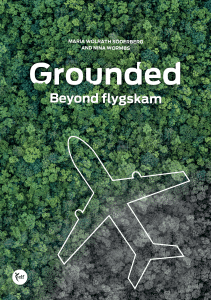The contribution to European carbon emissions from air travel is growing, and has become an increasingly important climate issue. Emissions per passenger have dropped in the past decade due to more fuel-efficient aircraft, but global international aviation emissions are projected to be around 70 per cent higher in 2020 than in 2005. Estimates show that emissions from global flying can be as high as 22 per cent of total emissions in 2050 if the sector fails to reverse the trend. This stands in conflict with the Paris Agreement and its goal of ensuring global warming is kept well below 2 degrees Celsius. In fact, the total per capita emissions needed to achieve the targets set in the Paris Agreement, which according to the 2018 IPCC-report, is less than 3-4 tonnes by 2030 and 1 tonne 2050. As a Brussels–Stockholm return flight emits 0.42 tonnes and a Brussels to New York return journey emits 1.9 tonnes, flights are clearly a large part of an individual’s emissions.
